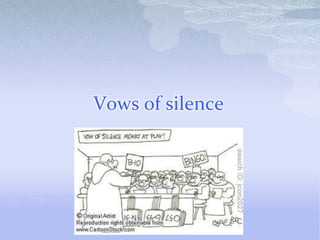
Vows of silence
- 2. A vow of silence is a religious vow, usually taken in a monastic context, to maintain silence. Known as Mauna in Hinduism, Jainism, and Buddhism, the practice is integral to Christian and Islamic traditions as well. Apart from that it is also followed as a spiritual practice.
- 3. Spiritual silence may be viewed from a threefold standpoint: As an aid to the practice of good, for we keep silence with man, in order the better to speak with God, because an unguarded tongue dissipates the soul, rendering the mind almost, if not quite, incapable of prayer. The mere abstaining from speech, without this purpose, would be that "idle silence" which St. Ambrose so strongly condemns. As a preventative of evil. Seneca, quoted by Thomas à Kempis, complains that "As often as I have been amongst men, I have returned less a man" (Imitation, Book I, c. 20). The practice of silence involves much self-denial and restraint, and is therefore a wholesome penance, and as such is needed by all.
- 4. Monasteries In monasteries of many orders there are special places, called the "Regular Places" (church, refectory, dormitory etc.) and particular times, especially the night hours, termed the "Great Silence", wherein speaking is more strictly prohibited. Outside these places and times there are usually accorded "recreations" during which conversation is permitted, governed by rules of charity and moderation, though useless and idle words are universally forbidden in all times and places. Of course in active orders the members speak according to the needs of their various duties.
- 5. In order to avoid the necessity of speaking, many orders (Cistercians, Dominicans, Discalced Carmelites etc.) have a certain number of signs, by means of which the religious may have a limited communication with each other for the necessities that are unavoidable.
